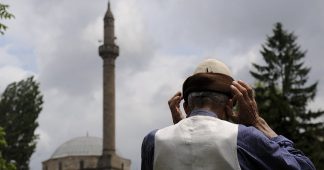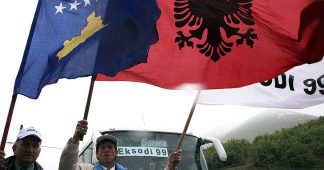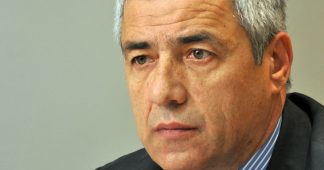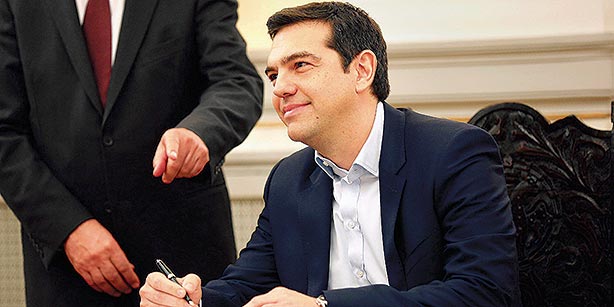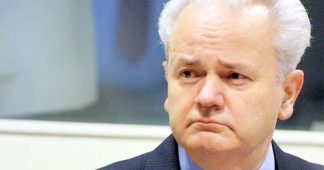By Aleksandar PAVIC
17.02.2018
February 17, 2018 marks the 10th anniversary of the “independence” of the territory referred to by its Western sponsors as “Kosovo.” This in spite of the fact that, according to UN Security Council Resolution 1244 and, thus, international law, Kosovo is a province of Serbia, whose Constitution refers to it as “Kosovo and Metohija.”
In the words of Russian Foreign Ministry spokeswoman, Maria Zakharova, whose country does not recognize the breakaway province:
“This is certainly an occasion to take a close look at the dire consequences of the policy of retroactively legitimizing NATO’s 1999 aggression and dismemberment of a European state – the Federal Republic of Yugoslavia… Unilateral secession that took place in 2008 in violation of the bedrock principles of international law failed to resolve the Kosovo issue and the prospects of its solution are still dim… Unilateral declaration of independence has failed to solve the region’s economic problems and attract investments. As a consequence, Kosovo remains the poorest part of the region from where people flee. This is compounded by rampant crime and corruption against the background of clashes of clan interests, security problems and vulnerability to the terrorist threat from the Middle East.”
Russian officials have been saying similar things for years – and not only they. Five EU states – Spain, Greece, Cyprus, Romania and Slovakia – still refuse to recognize the territory’s unilateral secession, as do China and India, major Muslim countries such as Iran and Indonesia, Israel, and the majority of Asian, African and Latin American countries.
But, somewhat surprisingly, on this round anniversary Russian assessments are being echoed by one of the main Western corporate media champions of the Kosovo Independence Project (not to mention of the current anti-Russian media hysteria gripping the U.S.) – the New York Times, in an article whose title speaks for itself: “Kosovo Finds Little to Celebrate After 10 Years of Independence”:
“Returning this winter, I was struck by how the relentless optimism of Kosovars had yielded to disillusionment. The people seemed weighed down by resignation, as well as widespread disgust at perceived government corruption…
“’I swear to God, if it wasn’t for all those who have laid down their lives for this, I would say let’s go back to the way it was before,’ one man told me. ‘We had a better life then; we had more opportunities…’”
Believe it or not, the disillusioned man is actually waxing nostalgic for the supposedly calamitous times of one of the most demonized figures of the Western unipolar, “end-of-history” victory lap – Slobodan Milosevic. The alleged “Butcher of the Balkans” himself. The man on whose frail shoulders the Western governing and media establishment has been tirelessly striving to heap the blame for its cynical joint criminal enterprise (JCE for short: an infamous device used by the Western-conceived ICTY ad hoc “tribunal” used to manufacture “war crimes” convictions without actual proof – mocked by some legal scholars to actually stand for “just convict everyone”) of facilitating the dismemberment of the former Yugoslavia and the ensuing mess that’s emerged as its byproduct.
The end of the world is surely nigh… After all, when was the last time the New York Times and the Russian Foreign Ministry agreed on anything?
Unfortunately, this congruence of views has come ex post facto. Had the sundry Western establishment centers heeded Russia’s pleas, warnings and counsel on this issue 10, 20, 27 years ago – the Balkans bloodshed of the 1990s, of which the Kosovo quagmire is a small, albeit important part, might well have been averted altogether, or at least mitigated. Imagine that, instead of favoring some parts and nations of multinational Yugoslavia (Croatia, the Bosnian Muslims, Kosovo Albanians) while, at the same time, demonizing others (Milosevic, the Bosnian Serbs and Serbia); that, instead of unilaterally recognizing various secessionist movements (especially those in Croatia, Bosnia-Herzegovina and Kosovo), arming the secessionists and (only) then “calling for peace” while, at the same time, imposing sanctions and, ultimately, bombing those fighting against secession (Bosnian Serb-held territory and Serbia proper) – the then-triumphant West had been a truly honest broker…
Admittedly, that is an oxymoronic concept. But, had such a miracle come to pass, the face of Europe might have been different. And, if not for the NATO bombing of the Federal Republic of Yugoslavia (i.e., Serbia) and its subsequent military occupation of its Kosovo province, it is quite possible that tensions between Russia and the West would not be running so high now. Russian President Putin has said as much on more than one occasion (e.g. even as late as 2016, in answering a journalist’s question on whether US-Russian relations had deteriorated due to the Syrian crisis, Putin did not invoke Crimea but, rather, Yugoslavia, specifically the 1999 NATO bombing of Serbia, as the true source of Russia’s alarm).
Faced with the past and present ugly reality of the Kosovo Independence Project, it is important not to lose sight of its true origins and motives. These were most convincingly and cogently presented in a May 2000 letter written by Willy Wimmer, then Vice President of the Parliamentary Assembly of the OSCE, to the German Chancellor Gerhard Schröder, summing up the key points of a U.S. State Department/American Enterprise Institute-sponsored conference that had just taken place in Bratislava, Slovakia, less than a year after NATO’s aggression against Yugoslavia/Serbia. These are the most relevant passages, as pertaining to the Kosovo Project and its (much broader) geopolitical aspects:
“4. The war against the Federal Republic of Yugoslavia was waged in order to rectify General Eisenhower’s erroneous decision during World War II. Therefore, for strategic reasons, American troops must be stationed there, in order to compensate for the missed opportunity from 1945…
“7. It would be good, during NATO’s current enlargement, to restore the territorial situation in the area between the Baltic Sea and Anatolia such as existed during the Roman Empire, at the time of its greatest power and greatest territorial expansion…
“8. For this reason, Poland must be flanked to the north and to the south with democratic neighbor states, while Romania and Bulgaria are to secure a land connection with Turkey. Serbia (probably for the purposes of securing an unhindered US military presence) must be permanently excluded from European development.”
So, the Russians might not be so “paranoid” after all in their views of NATO’s behavior in Europe… But, lest anyone think that this sort of militaristic megalomania has since been tempered, one need look no further than last November’s report by the NATO-affiliated think-thank Atlantic Council, calling for a “permanent American military presence in the Balkans,” ostensibly to “stabilize southeastern Europe amid increased Russian efforts to exert political influence across the region.” The key staging area for American troops? None other than Camp Bondsteel in Kosovo, “the largest and the most expensive foreign military base built by the US in Europe, since the Vietnam War,” set up after Yugoslav (i.e., Serbian) forces withdrew from the province after UNSC 1244 came into effect in June 1999.
So, the confused impartial observer still trying to figure out who’s to blame for the increasingly dangerous level of Western-Russia tensions need look no further than the poor, nasty, brutish and short history of the Kosovo Independence Project to realize that the NATO chicken has, by at least 18 years, preceded the Russian egg.
In this light, the following part of Maria Zakharova’s above-mentioned statement sounds more like a paragon of diplomatic understatement:
“The chaotic situation in Kosovo is being used to deploy NATO infrastructure, specifically the US Bondsteel base, to project the alliance’s influence in the Balkans and manipulate the processes in the region under the cover of UN Security Council Resolution 1244.”
To sum it up: as in Iraq, Syria, Libya – the results of US-led Western meddling in Yugoslavia/Serbia, and, specifically, Kosovo, have been unmitigatedly disastrous. Kosovo is, to quote Zakharova once more, truly a “black hole.” It is run by thugs, former (?) terrorists in Armani suits. Its “president,” Hashim Thaci, has been named as the “head of a ‘mafia-like’ Albanian group responsible for smuggling weapons, drugs and human organs through Eastern Europe, according to a Council of Europe inquiry report on organized crime.” Its “speaker of the parliament,” Kadri Veseli, has been listed by the Kosovo Albanian Bota Sot newspaper as a former director of the Kosovo Albanian SHIK secret service, a “death squad” responsible for numerous murders, violence, and war crimes committed in the province during 1998 and 1999. “Prime minister” Ramush Haradinaj is wanted by Serbia for war crimes, including murder, rape, the beheading of a baby, the burning of still-living police officers, etc. According to former ICTY prosecutor Carla Del Ponte, Haradinaj escaped conviction in The Hague chiefly through the intimidation and killing of numerous witnesses.
Of the more than 200,000 Serbs forced to flee the province after the withdrawal of Yugoslav Army forces, less than 2% have been allowed to return, and those that have returned are subject to intimidation and pressure to leave. Attacks on Serbian Orthodox Church property and intimidation of the clergy are frequent. Kosovo is a well known hub for the transit of drugs into Europe. It is a fertile ground for ISIS* and has, per capita, the highest number of fighters in its ranks in Europe.
Yet, the U.S. and most of the EU are still pressing Serbia to recognize Kosovo’s “independence.” Serbia’s pro-Western leadership is openly calling for compromise, but so far this is falling on deaf ears in the West, obviously intent on compounding its erroneous ways.
Not even the New York Times dare call today’s Kosovo mess a “success story.” Perhaps that is the only good news connected with this unhappy anniversary.
* Terrorist organization, banned in Russia by court order.
